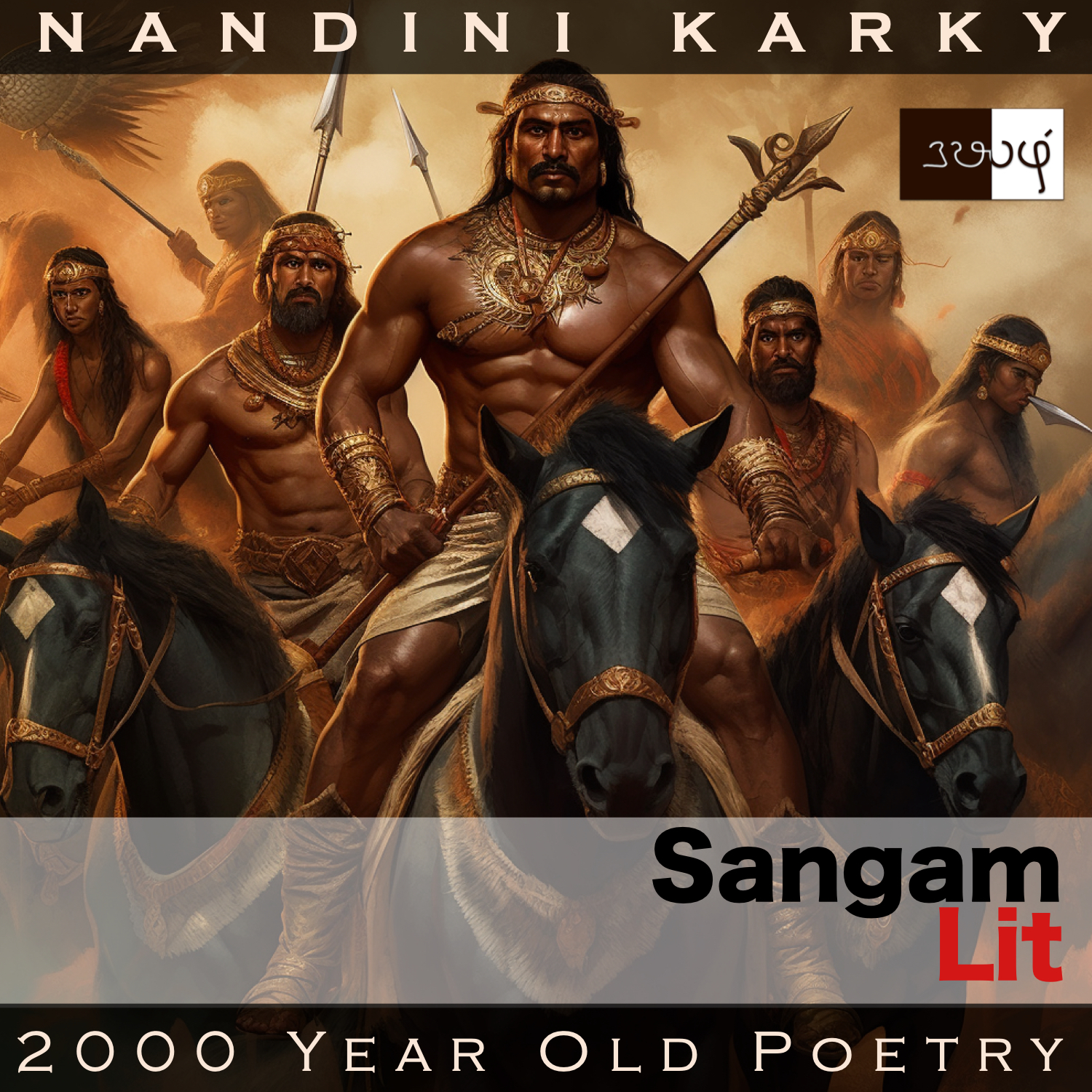Podcast: Play in new window | Download
Subscribe: Apple Podcasts | Spotify | Amazon Music | Android | iHeartRadio | Email | TuneIn | RSS | More
In this episode, we are presented with a list of great kings from ancient Tamil land, as depicted in Sangam Literary work, Puranaanooru 158, penned about the Velir King Kumanan by the poet Perunchithiranaar. The verse is situated in the category of ‘Paadaan Thinai’ or ‘King’s praise’ and talks about the new hope on the poets’ horizon.

முரசு கடிப்பு இகுப்பவும், வால் வளை துவைப்பவும்,
அரசுடன் பொருத அண்ணல் நெடு வரை,
கறங்கு வெள் அருவி கல் அலைத்து ஒழுகும்
பறம்பின் கோமான் பாரியும்; பிறங்கு மிசைக்
கொல்லி ஆண்ட வல் வில் ஓரியும்;
காரி ஊர்ந்து பேர் அமர்க் கடந்த,
மாரி ஈகை, மறப் போர் மலையனும்;
ஊராது ஏந்திய குதிரை, கூர் வேல்,
கூவிளங் கண்ணி, கொடும் பூண், எழினியும்;
ஈர்ந் தண் சிலம்பின் இருள் தூங்கு நளி முழை,
அருந் திறல் கடவுள் காக்கும் உயர் சிமை,
பெருங் கல் நாடன் பேகனும்; திருந்து மொழி
மோசி பாடிய ஆயும்; ஆர்வம் உற்று
உள்ளி வருநர் உலைவு நனி தீர,
தள்ளாது ஈயும் தகைசால் வண்மை,
கொள்ளார் ஓட்டிய, நள்ளியும் என ஆங்கு
எழுவர் மாய்ந்த பின்றை, ‘அழிவரப்
பாடி வருநரும் பிறரும் கூடி
இரந்தோர் அற்றம் தீர்க்கு’ என, விரைந்து, இவண்
உள்ளி வந்தனென், யானே; விசும்புறக்
கழை வளர் சிலம்பின் வழையொடு நீடி,
ஆசினிக் கவினிய பலவின் ஆர்வுற்று,
முள் புற முது கனி பெற்ற கடுவன்
துய்த் தலை மந்தியைக் கையிடூஉப் பயிரும்,
அதிரா யாணர், முதிரத்துக் கிழவ!
இவண் விளங்கு சிறப்பின், இயல் தேர்க் குமண!
இசை மேந்தோன்றிய வண்மையொடு,
பகை மேம்படுக, நீ ஏந்திய வேலே!
A long song that is something of a historical record. The poet’s words can be translated as follows:
“The ruler of Parambu, King Paari, the respected leader, who, as drums were struck with sticks and white conch shells were blown, battled with the three great kings, and in whose tall mountains resounding white cascades pour down, rolling rocks many; The skilful archer Ori, who ruled over the towering peaks of Kolli; King Malaiyan, who mounted on his horse called Kaari and crossed great battlefields many; Ezhini, who ruled over a horse that doesn’t trot, the mountain of Kuthirai, wielding a sharp spear, and wearing bael flowers and curving ornaments; Bekan, the ruler of the great mountain land with moist and cool slopes filled with many caves, where darkness resides, and the towering peaks of which are guarded by a god of great strength; King Ay, sung about by the man of perfect words Mosi; The famous and strong Nalli, who drove away enemies many and quenched the suffering of those who came with desire and ceaselessly rendered unto them;
After seven such great men passed away, I came here hoping, ‘For those who sing with suffering and others too, who come in supplication, there’s one who will end their yearning’. In the soaring mountains, where bamboos shoot to the skies, a male monkey, wanting to relish a jackfruit, finds a thorny ripe fruit and then calls out to its soft-headed mate with a hand gesture. With such unceasing prosperity is Muthiram, your domain, O lord! Such is your great fame, O Kumanan, the possessor of speedy chariots. Like your renowned generosity, may it reign supreme – that spear you wield over your enemies!”
Let’s take a closer look at the words herein. The poet goes on to some length to describe seven great Velir Kings in the Sangam era. Leading the list is Paari of Parambu, with details about his clash with the Chera, Chozha and Pandya kings. Next is the archer Ori, the ruler of Kolli hills. Following him closely comes Malaiyaman alias Kaari, riding a horse of the same name. The fourth in the list is Ezhini, who is in fact, Athiyaman Neduman Anji, and his domain is said to be ‘Kuthirai’, the Tamil word for ‘horse’ and to differentiate the two, the poet mentions that this ‘Kuthirai’ trots not! Then, comes Bekan, who is supposed to rule over a mountain country that’s protected by a God, and scholars are of the opinion that this refers to God Murugan and one of his seven hills in the Tamil country. Only two more to go and one is King Ay, whose great fame is in being sung about by the poet Mosi. This poet’s words must carry a lot of weightage to be a sign of honour for the king. Final in the list is Nalli known for his courage in the battlefield and compassion to those who sought his grace.
Why has the poet inscribed with his words this list of seven? Only to say that after those seven passed away, there was no one worthy to end the suffering of poets and other supplicants and the only hope was this king Kumanan, who ruled over the fertile peak of Muthiram. To etch this mountain land, the poet talks about the desire of a male monkey to eat a jackfruit and its wish being granted right there in the king’s land. Having found that thorny fruit, the monkey beckons its mate to come and share, the poet sketches. He then ends with a blessing to the king wishing for his generosity and the victory of his spear over enemies to reign supreme always. And thus, we get to meet a king, who is seen as the one come to fill the void left by seven and that’s a huge responsibility indeed!




Share your thoughts...